Dealing with the loss of a loved one is one of the toughest challenges anyone can face, and having the time to grieve is crucial for mental and emotional recovery. Yet, did you know that the amount of bereavement leave – and even whether you’re entitled to it – varies dramatically depending on where you live?
In this article, we’ll dive into the world of bereavement leave laws and explore how different cultures and governments handle this sensitive and universally important issue.
Let’s begin!
What Is Bereavement Leave?
Bereavement leave, sometimes known as compassionate leave, is time off an employee takes to grieve and manage affairs after the death of a loved one. It’s a crucial period that allows individuals to properly process their emotions, attend funeral services, and handle any necessary legal matters without the added stress of work obligations.
Bereavement Leave Laws in Different Parts of the World
Bereavement leave is treated differently around the world. While some countries mandate it by law, others allow employers to decide how to approach the matter on their own.
Here we present a brief list of the countries that have bereavement leave policies (or their equivalents) in effect. However, this list is not comprehensive by any means – in case your country is not included, you have to check what the law says yourself.
Australia
Under the Fair Work Act 2009, all employees are entitled to compassionate leave in case of the death of an immediate family member, stillbirth, or miscarriage. You can take up to 2 days off per occasion to grieve, attend a funeral, or handle other related matters.
This leave can be taken as a single continuous period or broken up with mutual agreement between you and your employer.
While it’s typically unpaid for casual workers, full-time and part-time employees often receive it as paid leave.
Belgium
In Belgium, employees are entitled to a few days off when they lose a close family member. The duration varies depending on the relationship to the deceased.
For instance, if the deceased is a spouse, a child, or a parent, the employee receives from 3 to 10 days of leave, which can be split up and taken within a year after the date of death. In case of the death of a sibling, a grandparent, a grandchild, a brother- or sister-in-law, etc., the employee gets just 2 days off.
Brazil
By law, employees are entitled to 2 consecutive days off work to mourn the loss of an immediate family member, which includes parents, children, siblings, and spouses.
Collective bargaining agreements and company policies can sometimes extend this period, so it’s always worth checking with HR.
Canada
In Canada, the rules can vary a bit depending on where you live because each province and territory has its own labor standards.
Federally regulated employees, like those working for banks, airlines, or telecom companies, are entitled to bereavement leave under the Canada Labour Code. They get up to 10 days off, though only the first 3 days are paid.
Meanwhile, in most provinces, the laws are similar but not identical:
- In Ontario, employees are entitled to 2 days of paid leave and up to 8 days of unpaid leave.
- In British Columbia and Alberta, it’s 3 days of unpaid leave, no questions asked.
- In Quebec, employees get 5 days of bereavement leave, 2 of which are paid.
All in all, it’s essential to check the specific regulations in your area.
Chile
If you lose a close family member, such as a spouse, civil partner, or child, you’re entitled to 7 days of paid leave. For other relatives (like parents or siblings), you get 3 days off.
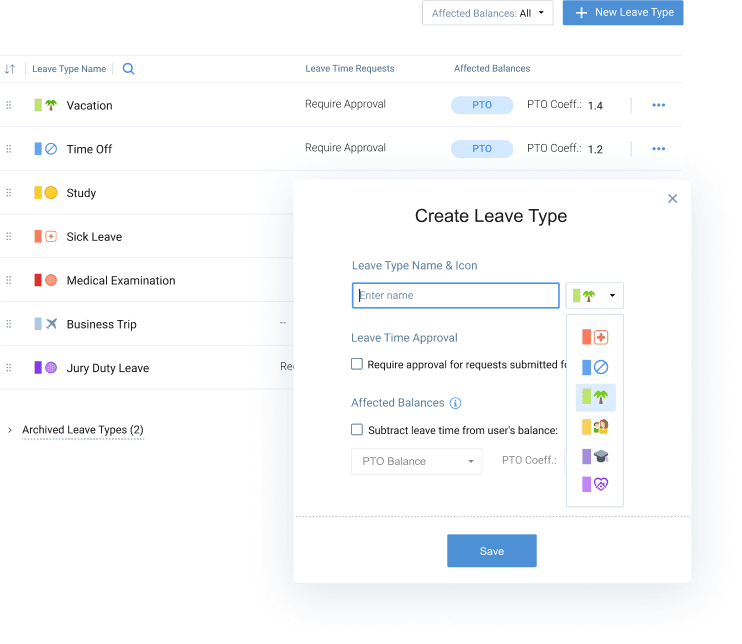
actiPLANS lets you create custom leave types and easily track them on a visual timeline.
China
Chinese labor law stipulates that employees are entitled to 1-3 days of paid bereavement leave upon the death of an immediate family member, including parents, spouses, and children.
While the national law sets a basic framework, local provinces and cities have the autonomy to set their own specific standards. Thus, some employers may offer extended leave periods or additional benefits.
Ethiopia
In Ethiopia, employees are entitled to 3 days of paid leave to manage the initial stages of their bereavement. While the exact duration can sometimes vary depending on the employer’s policies, the labor law serves as a protective umbrella ensuring employees aren’t left in the lurch when tragedy strikes.
France
The French labor law mandates that all employees, regardless of their length of employment, are entitled to paid leave following the death of a close family member.
Bereavement leave comes separately from the annual paid time off entitlement. It includes 3 days for the loss of a spouse, parent, or sibling. In case an employee loses a child, they get 12 days off. If their child is under 25 years old or is a parent themselves, an employee gets 14 days off.
Generally, bereavement leave must be taken immediately and cannot be deferred to a later date. However, in the case of the death of a child, it can be broken up into 2-3 periods within a year after the date of death.
Indonesia
According to the Indonesian Labor Law, workers are entitled to paid leave of up to 2 days if they suffer the loss of an immediate family member, which includes parents, in-laws, spouses, children, or siblings.
Japan
In Japan, full-time employees are entitled to take condolence leave (aka kibiki kyūka), which allows them to mourn the loss of a loved one without the stress of work responsibilities.
The duration of this leave ranges from 3 to 5 days, depending on the closeness of the relationship to the deceased. For example, the death of an immediate family member like a parent, spouse, or child generally warrants a longer period of leave compared to more distant relatives.
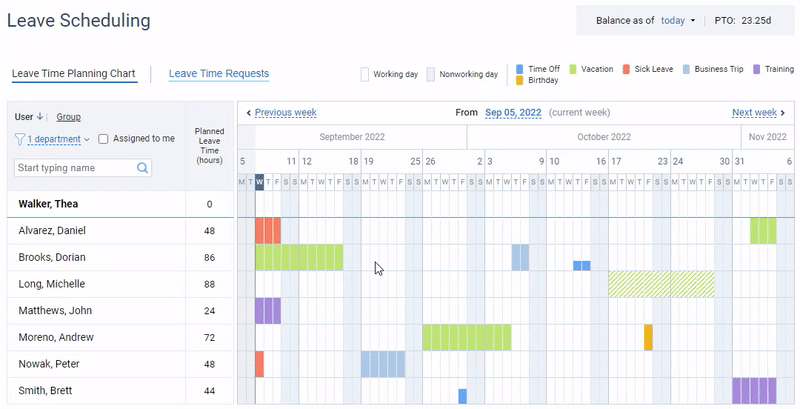
Use actiPLANS to request days off in a few simple clicks and approve employees’ leave requests automatically.
Netherlands
Bereavement leave is not yet a legal requirement in the Netherlands. However, an amendment to the law was suggested in order to support employees in families with minor children who have tragically lost a partner or child.
When the rules come into effect, this group of employees will be entitled to take 5 paid days of bereavement leave if they are in full-time employment.
At this moment, this entitlement remains just a recommended good practice for employers.
New Zealand
The Holidays Act 2003 states that you get 3 days of paid leave for the death of an immediate family member. The term “immediate family” covers a pretty wide range of people, including a spouse or partner, parent, child, sibling, grandparent, grandchild, and even in-laws.
Interestingly, if it’s someone outside this immediate circle, like a close friend or an extended family member, employees are still eligible for 1 day of paid leave if they need it. This is under the condition that an employer agrees that the employee’s relationship with the deceased person warrants it.
So, the bereavement leave law in New Zealand is not just set in stone – it’s got some flexibility to accommodate personal and cultural sensitivities, which is really thoughtful.
Peru
Peruvian labor law grants employees 5 days of bereavement leave when they lose a child, a spouse, a parent, or a sibling. In case a relative dies in a different location than where the employee’s workplace is located, the leave can be extended for a couple more days – the exact duration varies based on specific labor agreements or company policies.
South Africa
In South Africa, there is a family responsibility leave that is meant to help employees manage those sudden family emergencies without the added stress of work obligations.
If you’re employed full-time and have been working at your job for more than four months, and you work at least four days a week, you’re eligible for this leave. You get 3 days of paid leave per year for family responsibilities:
- When your child is sick,
- For the birth of your child,
- If you’re dealing with the death of an immediate family member.
Basically, this leave type combines parental and bereavement leave in a single package.
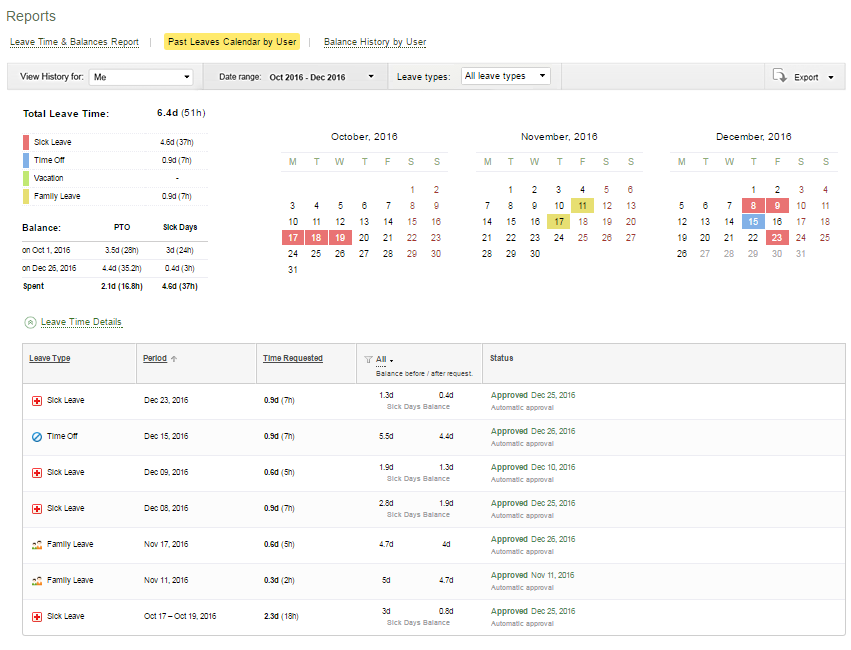
actiPLANS reports help you analyze the use of time off across the team and make informed resource scheduling decisions.
Spain
Spanish workers are entitled to 2 days of paid leave if the death of a relative occurs in the same locality where the workplace is. If travel is required, this leave period extends to 4 days.
Turkey
Under Turkish Labor Law, employees are allowed 3 days of bereavement leave if an immediate family member passes away. The expenses for this leave type are covered by the employer.
United Arab Emirates
According to the UAE Labor Law, employees are granted 5 days of paid leave for the death of a spouse and 3 days for the death of a close relative, such as a parent, child, sibling, grandparent, or grandchild.
United Kingdom
For parents who experience the devastating loss of a child under 18, the UK law steps in with the Parental Bereavement Leave policy – eligible employees are entitled to take up to 2 weeks off. The leave time is paid at a rate of at least £184.03 a week (or 90% of employees’ average weekly earnings).
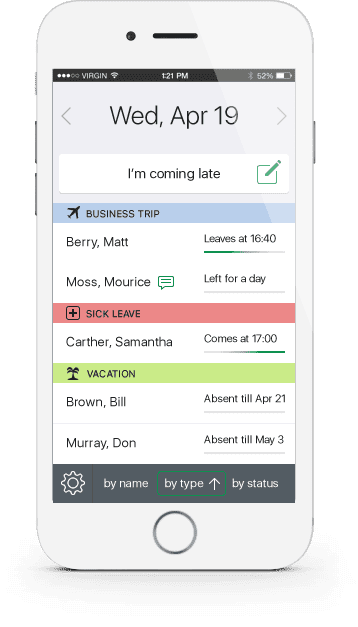
Request leave time and check on colleagues’ availability using actiPLANS Mobile.
Tips for Effective Bereavement Leave Management
- Communicate clearly and compassionately: When an employee needs bereavement leave, it’s crucial to express empathy. Acknowledge their loss and let them know their well-being is a priority. Clear, compassionate communication sets the tone for a supportive workplace environment.
- Set the rules: Develop a specific bereavement leave policy, outline all the relevant procedures, and communicate the rules to employees. Share the details – like the length of leave allowed and any documentation required. This helps streamline the management process and prevents any confusion.
- Be flexible: Grief doesn’t have a set timeline. Flexibility is key in managing bereavement leave. Consider options like extending leave or offering remote work. Show that you’re willing to adapt to their needs.
- Maintain confidentiality: Respect privacy by keeping details about the bereavement leave confidential. Share necessary information with relevant parties only, ensuring the employee’s situation is handled discreetly.
- Provide support resources: Offer additional support such as counseling services or Employee Assistance Programs. Providing access to professional help demonstrates that you care about their holistic well-being.
- Check-in without pressure: Make a point to check in with the employee, but don’t pressure them to return to work before they’re ready. A simple message expressing concern can go a long way in making them feel valued and supported.
- Plan for their return: When the employee is ready to return, ease the transition. Discuss workload distribution and any flexibility they might need. Being prepared for their return helps them re-integrate smoothly.
- Foster a supportive culture: Encourage a workplace culture of understanding and support. Promote open dialogue around grief and bereavement, making it clear that employees’ emotional health is taken seriously.
Manage Bereavement Leave the Easy Way with actiPLANS
Tracking bereavement leave, as well as other types of leave, is a breeze with actiPLANS.
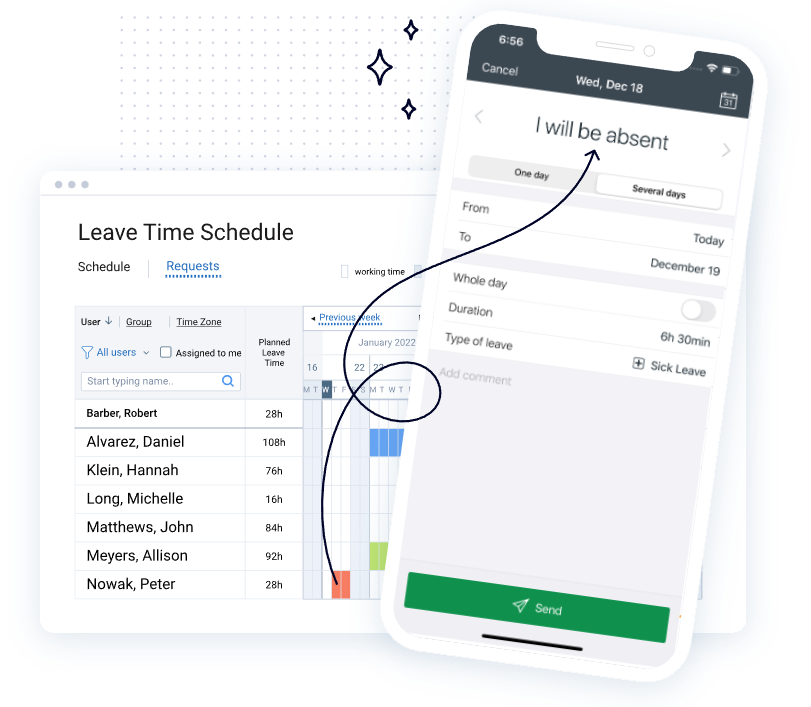
This nifty tool has several features that make managing time off both simple and effective.
- Custom leave types and accrual rules: actiPLANS allows you to define custom leave types, so whether it’s bereavement leave, maternity leave, or a much-needed personal day, you can set it up exactly as per your organization’s policies. Bespoke accrual rules let you handle leave balances accurately, ensuring everyone knows how much leave they’ve accrued and what they’re entitled to.
- Visual timeline for easy leave requests and tracking: The visual timeline gives a clear overview of who’s off and when, making it easy to plan projects and avoid staffing conflicts. Employees can see at a glance when they can request time off without causing a disruption.
- Employee self-service: With actiPLANS, employees have the power to manage their own leave requests. This cuts down on administrative workload and empowers your team to take control of their time off.
- Automated leave approval: Say goodbye to the endless back-and-forth emails. Approvals are automated, which means that when an employee submits a leave request, it goes directly to the manager for approval. It’s seamless and efficient!
- Email notifications: Nobody likes to be left in the dark about their leave status. With actiPLANS, email notifications keep everyone in the loop – employees get updates on their leave requests, and managers get reminders when they need to take action.
- Time off reports: Keeping track of leave can be a bit of a nightmare, but not with actiPLANS. The time off reports provide detailed insights into leave patterns and balances, making it easy to spot trends and plan accordingly.
- Mobile app: On the go? No problem. The mobile app ensures you can manage leave requests and approvals anywhere, anytime. It’s perfect for busy professionals who need to handle their leave management while out and about.
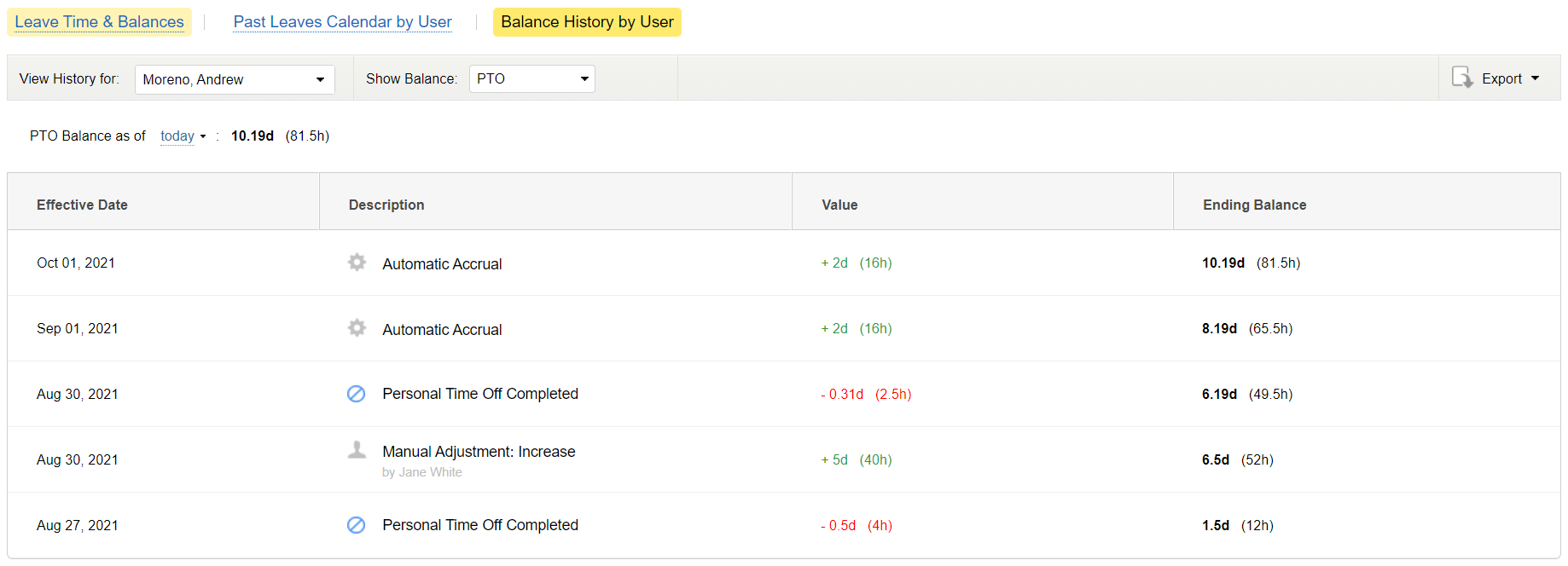
With actiPLANS, tracking leave time is no longer a hassle. So, lean on its powerful functionality to navigate the complexities of bereavement leave management with confidence and incomparable ease.



